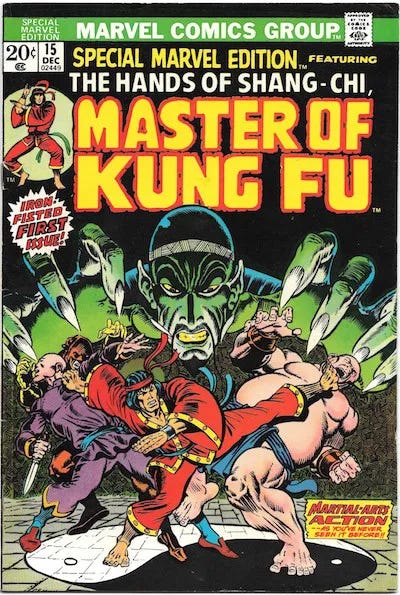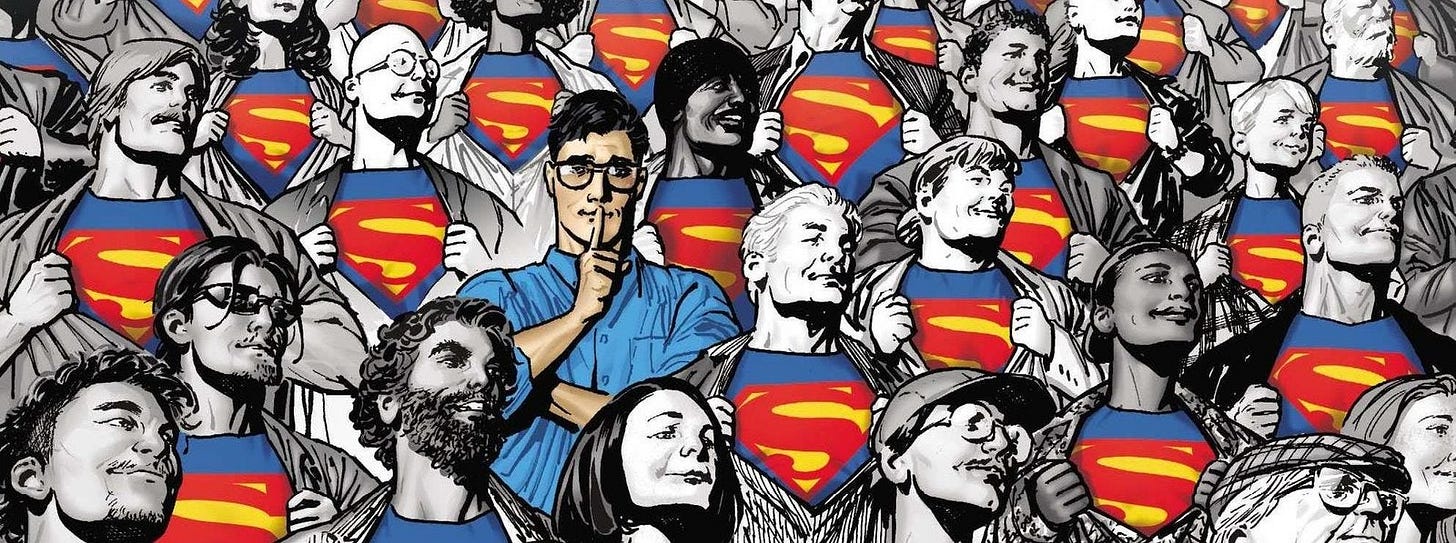
When I was a kid, one of my favorite comic book series was called The Immortal Iron Fist. The series drew inspiration from Chinese mythologies and had a character roster of several Asian superheroes. Having only previously read comics with white superheroes like Batman and Spider-man, Iron Fist quickly became my favorite comic for several reasons: it was well-written, the art was fantastic, and most of all, it felt validating seeing my culture and Chinese characters displayed in a positive light as the series mixed classic superhero stories with the Wuxia genre. However, there was just one problem. The titular character Iron Fist was a white guy who becomes a superhero after learning kung fu from a mythical Chinese city. The series crafted several well-developed Asian characters and based its plot-lines around Asian history and culture, yet still had a white man take the lead role in order to make the story “palatable” to mainstream audiences.
Due to comic books’ shoddy past with Asian representation, I was excited but still skeptical about Shang-Chi when the film was first released. Initially, it didn’t seem like Shang-Chi was that big of a deal for Asian American representation when there already had been several pioneering breakthroughs in recent years. Parasite, a film with an all-South Korean cast, won several Oscars and had box office success. A24’s The Farewell was able to tell Asian American stories while garnering critical acclaim. Even Crazy Rich Asians, despite all its problematic tropes, found success as a mainstream rom-com with an all-Asian cast. So what makes Shang-Chi a breakthrough? The movie’s unlikely to come up in conversations regarding cinematic classics compared to films like Parasite, and its box office earnings is merely a fraction of Crazy Rich Asians. But Shang-Chi is special for a very important reason: it’s a Marvel movie. From a cinematic and storytelling standpoint, Shang-Chi might be bogged down by Marvel’s formulaic plot-lines but being a superhero movie is also what makes it a defining moment for Asian representation in American media.
During the late 50s to mid 60s, Hollywood had a western craze with the number of westerns being produced outnumbering all other genres combined. It was also due to the popularity of these westerns in which the “cowboy” archetype became adopted as a mythical figure who was quintessentially American.
“At America’s cultural core, ‘the popular images of the West are recognized as an integral and indispensable part of American ethos and identity’...The cowboy was perceived by most as an exclusively American character.”
— Nicco Capozzi “The Myth of The American Cowboy”
Superhero movies in this regard have become no different than Hollywood westerns of the 60s. Although other genres like slashers, capers, and fantasy all received their run in the Hollywood spotlight throughout the decades, no other genre has replicated the western popularity as closely as superhero movies. As the figure of the cowboy slowly vanished from mainstream American media, superheroes emerged to take on the role of a figure that was uniquely American and embodying modern American values. It’s for that reason contemporary Superman stories focus on his status as an immigrant while Captain America has simultaneously become the symbol for both anti-facism and white nationalism. Therefore, having Asian actors be the face of a big studio superhero movie isn’t only a matter of representation in the media, but also a recognition that Asian Americans are Americans. With conversations on the perpetual foreigner stereotypes being heightened during the pandemic, Shang-Chi’s debut comes at a very important time by allowing Asian actors to take on the role of an American hero without having to shed their cultural identities in the process.
In theaters, I was met with a pleasant surprise the very moment Shang-Chi began playing. The film started with a monologue in Mandarin Chinese. Even while watching, I expected the dialogue to quickly transition to English with occasional Chinese words sprinkled in to remind the audience of the cast’s ethnicity. Instead, characters continued to speak Chinese to each other in contexts where it made sense to. It felt like a cultural shift that Marvel, a studio notorious for avoiding risks, had allowed so much of the film to be in subtitles. It’s obvious that this move wouldn’t have happened without a number of Asian talents working behind the scenes with key figures like director Destin Daniel Cretton, screenwriter Dave Callaham, and stunt choreographer Andy Cheng making sure there was passion and research poured into the film’s creation.
“That doesn’t mean we got everything right, but I do think that people will see that we have a deep respect. We’re trying really hard to get it right. And I hope they see the love that we put into this.”
— Destin Daniel Cretton “Shang-Chi’s Director on Making a Marvel Movie With Asian Americans in Mind”
One of my favorite parts about Shang-Chi is the fact that it was loaded with references and homages to a variety of classic Chinese films. The film’s first fight scene plays tribute to Jackie Chan’s kung fu comedies as Simu Liu fends off assailants with laptops, jackets, and bus poles while delivering Chan’s iconic catchphrase “I don’t want any trouble.” Meanwhile, the intro sequence depicted a vibrantly colored fight-dance sequence reminiscent of Jet Li’s Wuxia classic Hero. Even the film’s climax of having two dragons duke it out seemed to be a nod towards modern Chinese blockbusters' penchant for having grand CGI finales. The main antagonist of the film, Wenwu, is an immortal who has taken on the role of a conqueror, a romantic, and a gangster. He’s played by legendary Hong Kong actor Tony Leung who embodied all such roles in the past with performances in John Woo gangster flicks to Wong Kar-Wai romances. With an amalgamation of such references, iconic casting, and Chinese film tropes, Shang-Chi wears its inspirations on its sleeve in a way that makes the movie oddly nostalgic.
But for all that Shang Chi does well, it’s also overly enthusiastic to tout the film as a cultural touchstone or victory for Asian audiences. Most of the film is rooted in Chinese culture and characters, and expecting all Asian audiences to relate to the film ignores just how varied Asian cultures are. Shang-Chi also has polarized the international Chinese community, with mixed reviews in mainland China due to criticisms of the film being dependent on orientalist aesthetics. This isn’t necessarily surprising considering the Shang-Chi comics were created by three white men in the 70s trying to capitalize on the era’s Kung Fu craze. Alongside the creation of Shang-Chi, Marvel also bought the rights of the character Fu Manchu, a racist and orientalist caricature, to become Shang-Chi’s main villain. As much as Marvel has tried to divert the character away from its racist origins, it does beg the question of whether or not Shang-Chi should even be the symbol for Asian superheroes.

All in all, it may be too early to judge the impact or importance of Shang-Chi on cultural representations for Asian Americans. However, at the very least, the success of Shang-Chi is a statement on how far we’ve come since the 70s. With the production drama behind the scenes, it’s obvious that Shang-Chi had a lot to prove, and it blew past expectations with a box office exceeding the first Avengers movie despite being released during the pandemic. None of which would’ve been possible without the work being put in by Asian creatives in Hollywood vying for representation in an environment that’s ambivalent at best and hostile at worst.
As much as I can commend and critique Shang-Chi for its merits and missteps or analyze its cultural references, at its core, the most important thing about Shang-Chi is simple: Asian Americans finally have an onscreen hero who looks like them. And that matters.
What are your thoughts on Shang-Chi? Did you enjoy the movie and was the representation adequate? Let us know!
To further decolonize our minds:
Shang-Chi, Fu Manchu, and Marvel’s Asian Problem | Jessica Plummer
Why Asian superhero Shang-Chi could truly change the world | Kesewaa Browne
Why Shang-Chi’s Success Matters - and Why it Shouldn’t | Alex Abad-Santos
Shang-Chi and the Legend of the Ten Rings Made Me Feel Seen Like No Other Hollywood Blockbuster Has | Kat Moon
If you liked what you read, be sure to subscribe above and follow us on Twitter and Instagram @invisibleasians to stay updated on Politically Invisible Asians!




